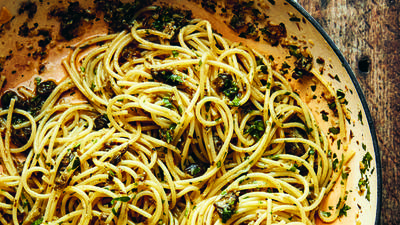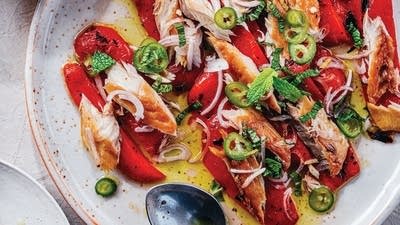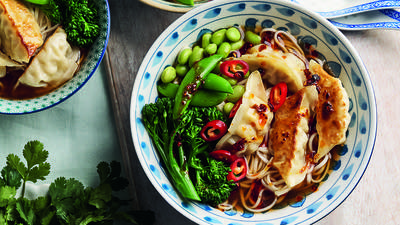
The next time you grab a bite at a food court, look around. Chances are you’ll see a Panda Express. With nearly 2,000 restaurants, Panda Express is the largest family-owned American Chinese food chain in the United States. Notice we said “American Chinese,” not “Chinese American.” Forty years ago, when Andrew and Peggy Cherng opened their first restaurant, all they wanted was to do was assimilate: keep their heads down, work hard, and be as American as possible. Their daughter, Andrea Cherng, is now at the helm as the chief marketing officer. Like her parents she’s dedicated to growing the business. She’s also dedicated to honoring them by reclaiming their heritage. As part of our celebration of Chinese New Year, contributor Melanie Dunea talks with Andrea about the ethos behind that family business.
Melanie Dunea: How did your family business start?
Andrea Cherng: Over 40 years ago, our family started the Pasadena Panda Inn. It's a sit-down, family-style restaurant in Pasadena, California. My father was front of the house, the person that greeted and welcomed you. My grandfather was back of the house, in the kitchen. As a little girl growing up in the restaurant, there are pictures of me sitting at the appointment book and pretending that I'm taking in appointments. But my favorite memory is one that my grandmother tells me of. When I was really little and I would go into the kitchen looking for my grandfather, he would pick me up and feed me spoons full of hot and sour soup. I just loved the taste of hot and sour soup. You can imagine this little girl, just gleeful with lips a little pursed from the sour of the soup. He would hold me and feed me hot and sour soup in the kitchen.
 Andrea Cherng
Andrea Cherng
MD: The women didn't do the cooking, it was the men?
AC: My grandfather was the chef and he's inspired many of our recipes to this day. He was trained in Yanzhou in culinary, then traveled to Japan and was the head chef at a hotel, then immigrated to the U.S. and started his own restaurant with my father.
MD: When the current variation of Panda Express opened, was it meant to be an American Chinese restaurant or a Chinese restaurant?
AC: My family story of opening American Chinese restaurants is very similar to many immigrant stories of the U.S. They came here and needed to build a life for themselves. My mother, for example, came and studied mathematics and electrical engineering. She has a Ph.D. in electrical engineering, and ended up joining the family business as a way of supporting the family. You hear a lot of immigrant stories of individuals coming from China to the U.S., and because they were blocked out of certain professional spheres, ending up opening restaurants. They took what they knew and they tailored it to an American audience, in order to have the volume of business they needed to provide. We started with one restaurant over 40 years ago, and now are approaching 1,900 restaurants. We started as one family, now we have over 30,000 families that we help support and that are the driving force behind our success. That's an incredible feat.
MD: What does Panda Express represent now?
AC: Panda Express represents how many people in the U.S. embody dual identities. It's not more American or more Chinese. It's much like I am – both American and Chinese. I am influenced by both in the same ways that our food is influenced by both. What becomes really important is to understand our role as an ambassador of Chinese food to the U.S., and as an ambassador of Chinese culture. We always start with, "What is the authentic Chinese inspiration?" For our chefs, they often ask "What are the food memories that you had growing up in your households? Like the comfort food that your mom made for you, that is authentically Chinese, how do we bring that to a wider audience?"
 Orange Chicken at Panda Express
Orange Chicken at Panda Express
MD: Speaking of which, the orange chicken, I heard, is so crazy popular that one out of five people order it.
AC: One out of three, actually. Around 30 percent of our mix is orange chicken. We just opened our first restaurant in Japan, and over 90 percent of the transactions involved orange chicken.
MD: There must be some pressure for you being in this family business. They didn't just hand you this job.
AC: No, they did not just hand me this job. More than anything else we, as a family, think a lot about stewardship. One of the rules, or one of the maxims, of our family is that the family serves the business and the business doesn't serve the family. I remember there was this scene right after college where my father came to visit me. I was set on a very different trajectory and determined to set my own path. I remember him stopping me one night before going to bed and asking me, "Andrea, how are you going to take care of our people?" And I, in my sort of young adulthood independence, was thinking in my mind, "These are your people, they are not my people. I've never agreed to take on your people.” But that ethos has been so ingrained in us, that we often think about how we are going to take care of the people that are the success of our business. That pressure comes from asking “How do we ensure that the jobs that we provide are really speaking to our mission of inspiring better lives?” I have to say that sometimes I take myself too seriously and put too much pressure on myself. But in all of this, what we do – as Peggy will say – is we look for what is best for our people and what is best for our company. We do everything in our power to be able to deliver on what's best.
Before you go...
Each week, The Splendid Table brings you stories that expand your world view, inspire you to try something new, and show how food connects us all. We rely on your generous support. For as little as $5 a month, you can have a lasting impact on The Splendid Table. And, when you donate, you’ll join a community of like-minded individuals who love good food, good conversation, and kitchen companionship. Show your love for The Splendid Table with a gift today.
Thank you for your support.
Donate today for as little as $5.00 a month. Your gift only takes a few minutes and has a lasting impact on The Splendid Table and you'll be welcomed into The Splendid Table Co-op.



